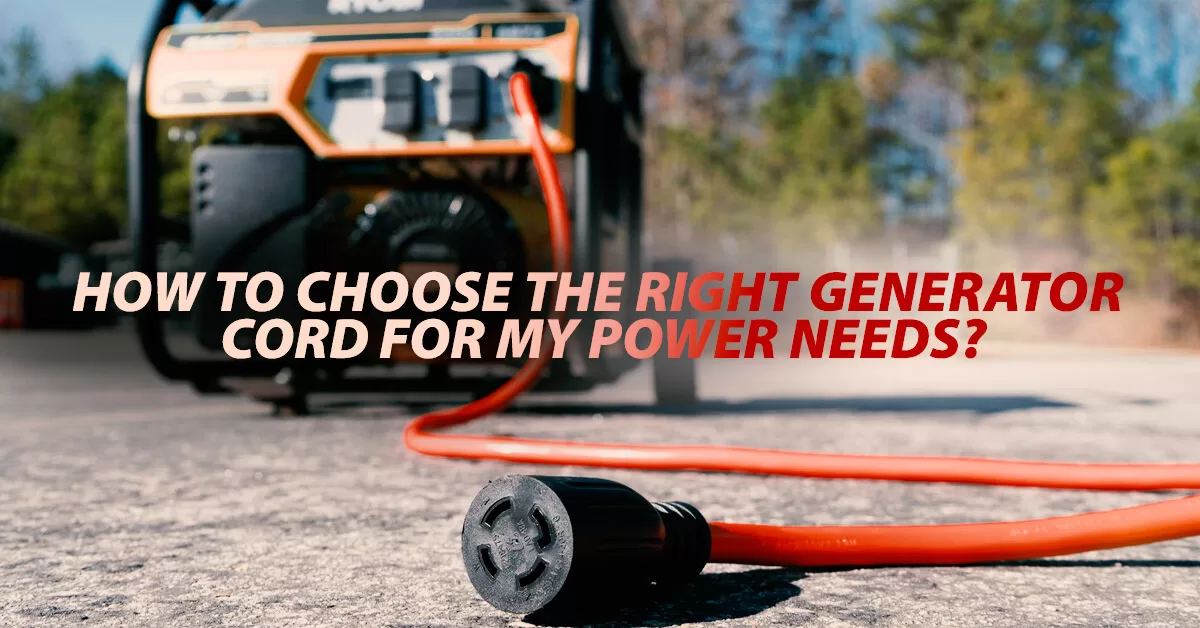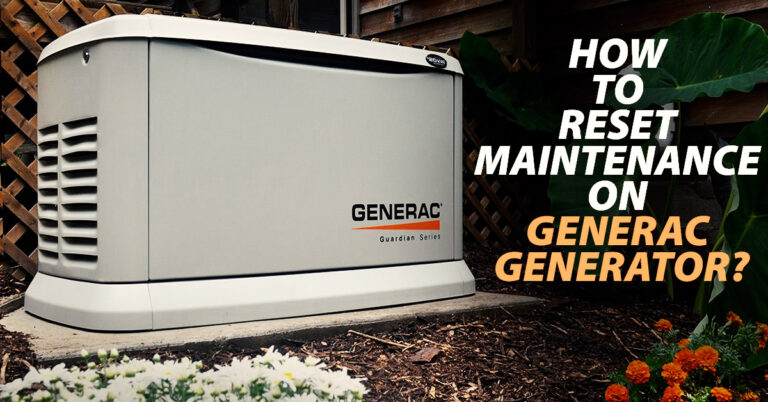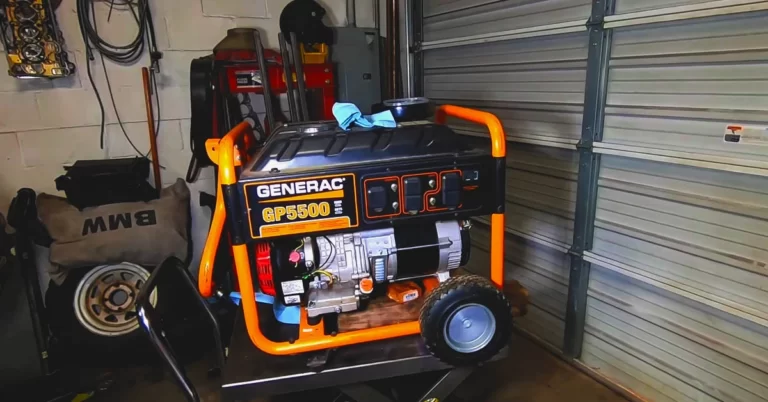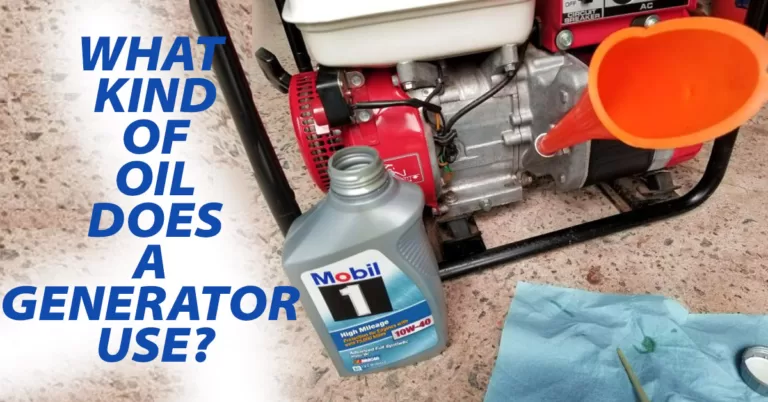How To Choose The Right Generator Cord For My Power Needs?
Today’s society relies on power. Energy is essential for powering appliances and charging electronics. After a natural disaster or power loss, reliable electricity may not be available. In these situations, a generator may save the day by providing energy. To maximize your generator’s performance and safely power your appliances and equipment, use the right generator cable. In this post, we will explore How To Choose The Right Generator Cord For My Power Needs? what kind of extension cord is best for a generator?
Importance Of Choosing The Right Generator Cord
Choose the right generator cord for many reasons. First and most importantly, the proper generator cord can prevent accidents. Electrical shocks and fires are more likely with a defective or hazardous wire. Using the wrong generator cord might damage your equipment and appliances, requiring costly repairs or replacements.
Choose the right generator cable to maximize generator performance. If you use a cable not rated for the wattage of your equipment and appliances, you risk having insufficient power, which will make your generator work harder and maybe overheat. However, using a cable with more power than needed may waste time and money.
Factors To Consider When Selecting A Generator Cord
When choosing a generator cord, there are several things to keep in mind. These consist of:
Wattage
Wattage indicates a generator cable’s safe electrical power. Calculate the wattage of all the equipment and appliances you intend to use with the generator to determine the necessary wattage. To ensure that it can handle power demand, choose a cable with a wattage rating greater than the predicted wattage.
Length
Another crucial aspect to think about is the generator cord’s length. To establish the length of the cord required, measure the distance between the generator and the site of usage. It’s crucial to choose a cable that is long enough to reach your equipment and appliances while not going above the generator’s output limit.
Listing By UL
The independent company UL (Underwriters Laboratories) certifies and tests items to make sure they adhere to safety and quality requirements. Look for the UL listing and approval on a generator cord to ensure its security and dependability.
NEMA Ratings
Choose a generator cable based on NEMA ratings. The National Electrical Manufacturers Association rates cord by plug and receptacle. Since NEMA ratings are excellent for different places and purposes, choose a cable that fits your needs.
Gauge
The thickness of the wire used in a generator cable is referred to as its gauge. A chord with a lower gauge number has a thicker wire, which implies it can carry more electrical current has a thicker wire, which implies it can carry more electrical current or amperage. Make sure you choose a cable with the proper gauge for the required length and power.
Compatibility With Outlets And Plugs
It’s crucial to choose a cable with the appropriate connector for your generator and the appropriate outlet for your equipment and appliances. A secure and safe connection will be achieved by matching the plug and outlet.
You may pick a generator cable that satisfies your particular power requirements and enables you to get the most out of your generator by taking these considerations into account.
How Do I Determine The Wattage Needed For My Generator Cord?
A crucial step in choosing the appropriate cable is figuring out the power requirements for your generator cord. The amount of electrical power that a generator cable can safely carry is indicated by its wattage.
How Do I Calculate The Wattage Of My Appliances And Tools?
The procedures below may be used to determine the wattage of equipment and appliances that will be used with a generator:
- Make a list of every instrument and appliance you want to use with the generator.
- Find out how many watts each item on your list uses. Usually, you may find this information on the appliance or tool itself, in the owner’s guide, or online. If the wattage is not readily available, you may approximate it by dividing the voltage (often 120V for tools and appliances) by the amperage.
- The total wattage required may be calculated by adding the wattages of each item on your list.
For instance, the total amount of energy required would be 2,000 watts (500 + 1,000 + 500) if you had a refrigerator that needs 500 watts, a microwave that requires 1,000 watts, and a power drill that uses 500 watts.
It’s crucial to remember that depending on how they are used, the wattage of various equipment and appliances, such as motors and heaters, may change. It’s a good idea to choose the maximum wattage rating in these circumstances to make sure you have a suitable power source.
Choose A Generator Cable With A Higher Wattage Output.
It’s crucial to choose a generator cable with a wattage rating greater than the predicted wattage after determining the wattage of your equipment and appliances. By doing this, you can be confident that the cable has enough power to meet the demands of your equipment and appliances.
For instance, if you determined that your equipment and appliances need 2,000 watts in total, you should choose a generator cable with a wattage rating of at least 2,000 watts or greater.
It’s important to know that a generator cord’s wattage rating is different from its output. The generator’s wattage output is its maximum power, whereas the cable’s wattage rating is its maximum safe power. To avoid overloading the generator, use a cord within the wattage output range.
Choose a generator cord with a wattage rating higher than the predicted wattage to ensure you have adequate power and that your generator is working at its maximum capability.
How Do I Determine The Length Of Cord Needed?
Another crucial aspect to take into account when choosing a cable is the length of the generator cord. Consider the following procedures to calculate the required length:
Measure The Distance Between The Generator And The Point Of Use
The generator’s distance from the usage site should be measured (e.g., the outlet where you will plug in your appliances and tools). This will help you determine the bare minimum cable length required.
Choose A Cord Length That Meets Your Demands And The Generator’s Output
Select a cable that is the right length for your requirements and the generator’s output range. It’s crucial to have a cable that is long enough to reach your equipment and appliances but not so long that it uses up all of the generator’s power.
The greatest amount of power that a generator is capable of producing is referred to as its output capacity. A voltage drop might occur if the cable is too lengthy or contains a wire that is too thin, making the power supply inadequate for your requirements.
What is UL listing, and why is it important?
It’s crucial to use generator cables that are UL-listed and certified when making your choice. The independent company UL (Underwriters Laboratories) certifies and tests items to make sure they adhere to safety and quality requirements. A product is UL-listed if it has undergone testing and has been determined to fulfill UL’s safety and performance standards.
A UL-listed and authorized generator cord may help guarantee the cord’s dependability and safety. These cables are more likely to be strong and capable of handling the demands of supplying electricity to your equipment and appliances.
Check the manufacturer’s warranty and return policy in addition to seeking out cables that are UL-listed and certified. This might show you how confident the product’s creator is in it and provide protection in the case that the cable malfunctions or has any other problems.
Choosing cables that are UL-listed and authorized will provide you with the assurance that you are utilizing a reliable and secure product.
NEMA Rating
For the electrical sector, technical recommendations are created by the National Electrical Manufacturers Association (NEMA), a standards body. NEMA standards play an important role in the selection of generator cables.
When buying a generator cord, you’ll notice that the cables often have a NEMA rating printed on them. The plug and receptacle types used on the cable are identified by this rating. Choose a cable with a NEMA rating that is suited to your requirements since different NEMA ratings are good for various locations and uses.
How Do I Choose The Right Gauge?
When making this choice, it’s essential to get a generator cable that has the proper gauge for your particular needs. Gauge is the term used to describe the thickness of the wire used in a generator cable. Lower gauge numbers mean that the cable is thicker, which means that it can carry more electricity.
Consider the following when choosing the gauge that best suits your requirements:
Wattage
As said, a generator cord’s wattage indicates its safe electrical power capacity. Choose a cable whose gauge matches your appliances’ wattage.
Length
The right gauge may also depend on how long the cord is. To ensure an adequate power supply, the gauge should typically be greater as the cable length increases.
Generator Output
Ensure that the gauge of the cable you purchase is compatible with the generator’s output capability. A voltage drop can happen if the cable is too long or has too small of a gauge. This means that the power supply isn’t enough for your needs.
Single- And Multi-Strand Cord
The amperage rating of the cord should also be taken into account when deciding between single-strand and multi-strand generator cords. Single-strand cords are usually better for lower amperage levels and may not be able to handle higher amperage rates as well as multi-strand cords.
Consider The Type Of Plug And Outlet
When selecting a generator cable, it’s important to consider the kind of socket and outlet that meet your specific needs. Make sure the cable has the proper plug and outlet types for the generator and the machinery or appliances you want to use. Plugs and outlets come in a wide variety of styles.
Here are some popular plug and outlet types:
Three-Prong Plugs
These plugs are often used with equipment and appliances that include a grounding wire. They have three prongs.
2-Prong Plugs
These plugs have two prongs and are often used with electrical equipment and appliances that lack a grounding wire.
120V Outlets
The majority of equipment and appliances operate off of these outlets, which are generally found in homes.
240V Outlets
Larger equipment and appliances like stoves and dryers often use these outlets.
Check that the cable has the correct type of connector for the generator and outlet for the appliances or equipment to ensure a secure and safe connection. By doing this, you may assure safe driving and dependable electricity for your needs.
Which Extension Cords For Generators Are Recommended?
GearIT 30-Amp Generator Extension Cords

Heavy-duty GearIT 30-Amp Generator Extension Cords link portable generators to manual transfer switches to power homes and RVs. 250 volts and 30 amps power it. NEMA L14-30P/L14-30R twist lock connections minimize power loss with this cable. The bright green cable helps avoid mishaps in low light. It can endure sun, rain, snow, and temperature fluctuations. It also works at 104 degrees Fahrenheit without overheating.
This extension cable is great for natural catastrophes and RV travel. It keeps equipment operating during power shortages. It comes in 6.6, 40, 50, and 100-foot lengths. The GearIT 30-Amp Generator Extension Cord is versatile. It works with RVs, portable generators, and manual transfer switches. Its 250-volt rating allows it to power many electronics and appliances.
Champion Generator Power Cord

Champion 25-Foot 30-Amp 250-Volt Generator Power Cable is a high-quality extension cord for manual transfer switches and portable generators. It can extend electricity from your generator to your home’s transfer switch with up to 30 amps.
Flexibility distinguishes this cable. In cold and hot climates, the 25-foot, 10-gauge wire remains flexible. Its 250-volt rating makes it appropriate for many power needs.
This weatherproof cable is flexible. Its service-grade, abrasion-resistant SJTW insulation keeps it safe and reliable in a range of settings.
The Champion 25-foot, 30-Amp, 250-Volt Generator Power Cord is also safety-minded. It extends electricity up to 25 feet, protecting you and others from the generator exhaust. It’s ideal for personal and business usage.
The Champion 25-foot, 30-Amp, 250-Volt Generator Power Cord has several simple and easy-to-use features in addition to its basic functions. Its male-to-female connection lets it connect to the generator and transfer switch. Even a novice electrician can put it up and use it.
RVGUARD 30 Amp Generator Extension Cord

High-quality RVGUARD 4-prong, 30-amp, 10-foot generator extension cord for portable generators (NEMA L14-30P to L14-30R SJTW 10 gauge, 4 prong, 125/250 volts
This cord’s construction is notable. Its high-quality materials can survive daily usage. The twist lock plug keeps the chord from sliding off, and the strain relief structure makes it hard to pull out. Its large gauge and pure copper wire prevent the cable from overheating after lengthy usage. This cable is waterproof and durable. It is safer for emergency and adverse weather usage, making it a good option for many applications.
The RVGUARD 4 Prong, 30 Amp, 10 Foot Generator Extension Cord has several useful features. A colorful storage bag and cable organizer with a handle help tidy the cord for storage. The cable is simple to carry and store. The RVGUARD 4 Prong, 30 Amp, 10 Foot Generator Extension Cord offers many unique characteristics that make it practical and simple to use. Its male-to-female connection lets it connect to the generator and transfer switch. Even a novice electrician can put it up and use it.
This cable is versatile. It works with RVs, portable generators, and manual transfer switches. Its 250-volt rating allows it to power many electronics and appliances.
Yodotek 50 FEET Heavy Duty Generator Locking Power Cord

High-quality portable generator extension cords include the Yodotek 50 FEET Heavy Duty Generator Locking Power Cord. 125/250 volts, NEMA L14-30P/L14-30R 4-prong configuration.
Durability distinguishes this cable. Its high-quality materials can survive daily usage. Its large gauge and pure copper wire prevent the cable from overheating after lengthy usage. UL-certified with file number E257089, it passes high safety and performance criteria.
This cable is waterproof and durable. Its SJTW cable is 105 degrees Celsius and FT-1 fire-resistant, making it suitable for many settings. Its water resistance makes it suitable for emergency and harsh weather usage.
Additional characteristics make the Yodotek 50 FEET Heavy Duty Generator Locking Power Cord simple and easy to use. Its twist-locking mechanism prevents wind, rain, and other weather from pulling the cable out of the generator socket. It comes with a 1-year quality warranty and 3-year customer service, ensuring its long-term reliability.
The Yodotek 50 FEET Heavy Duty Generator Locking Power Cord includes many unique characteristics that make it practical and simple to use. Its male-to-female connection lets it connect to the generator and transfer switch. Even a novice electrician can put it up and utilize it.
Conclusion
Your generator’s safety, efficiency, and performance depend on its cord. Considering wattage, length, UL certification, gauge, and socket and outlet compatibility, you may choose a generator cable that meets your power needs and maximizes generator performance.
Use a generator safely by following the manufacturer’s instructions. By choosing the right generator cable, you can be certain that your power needs are met.







